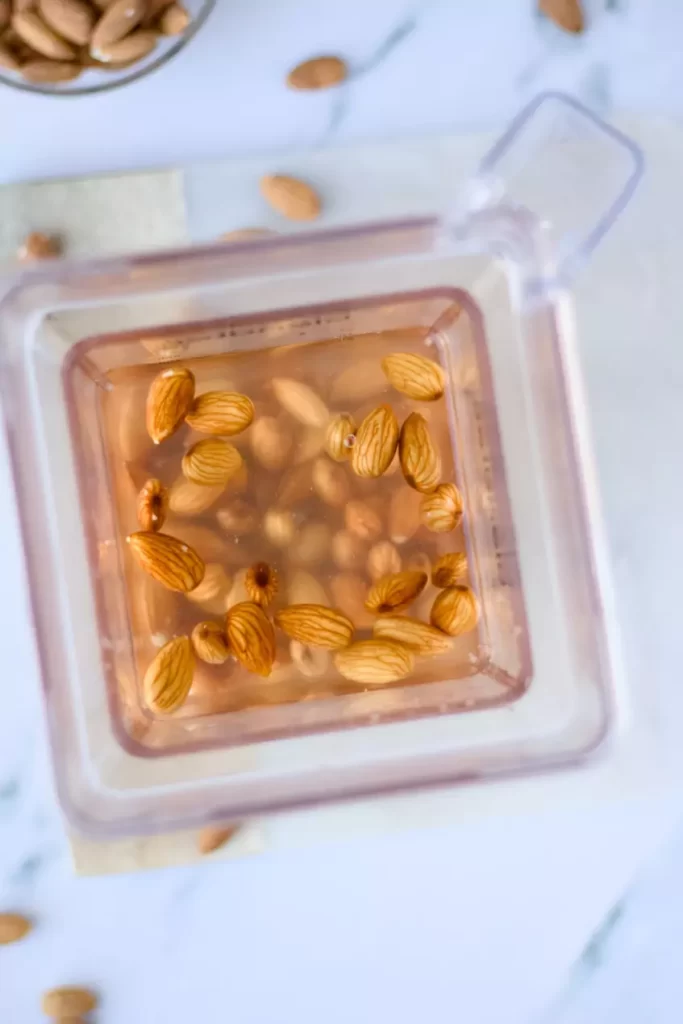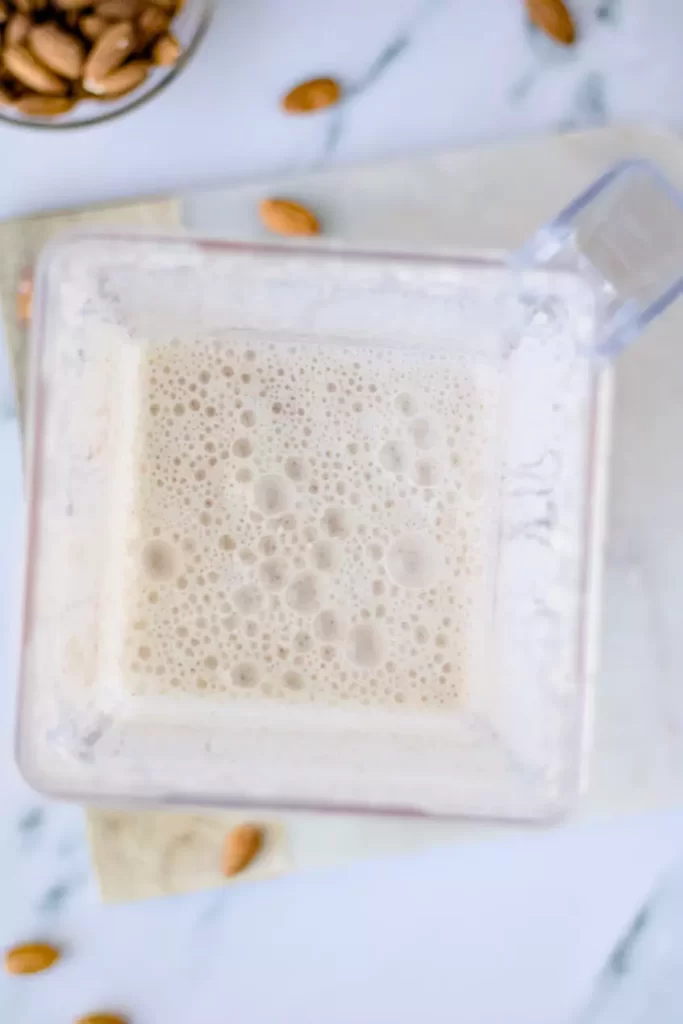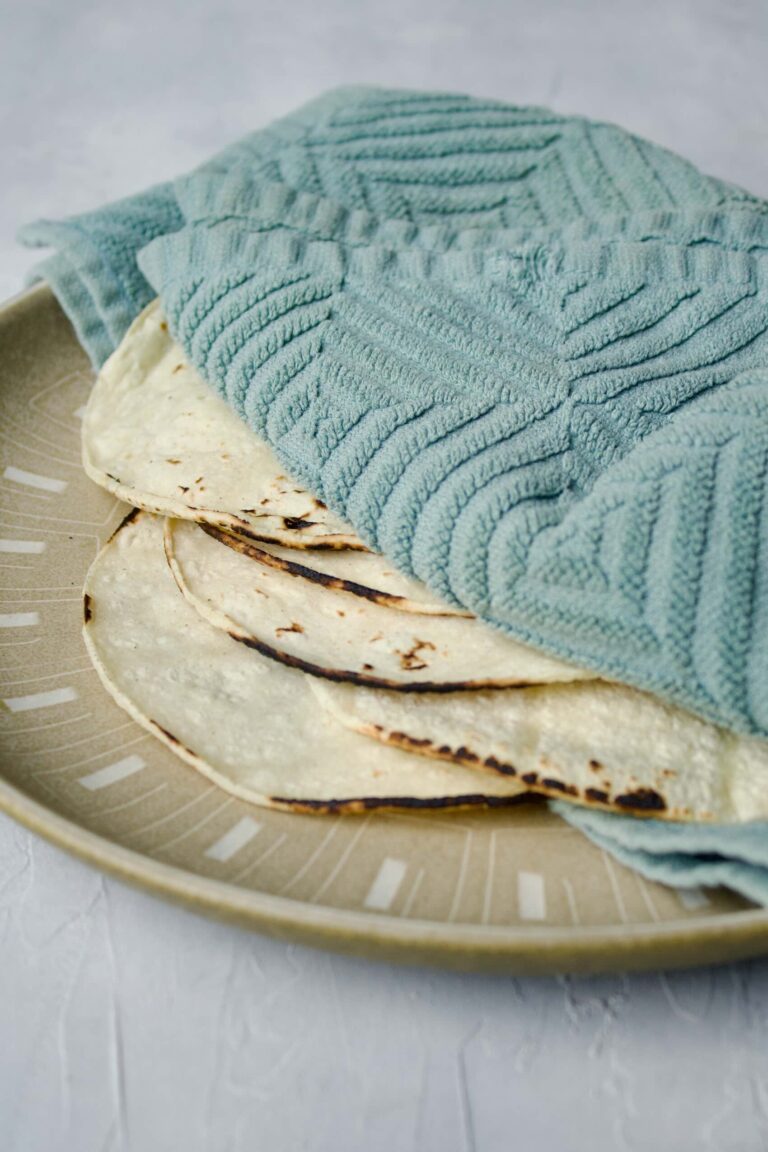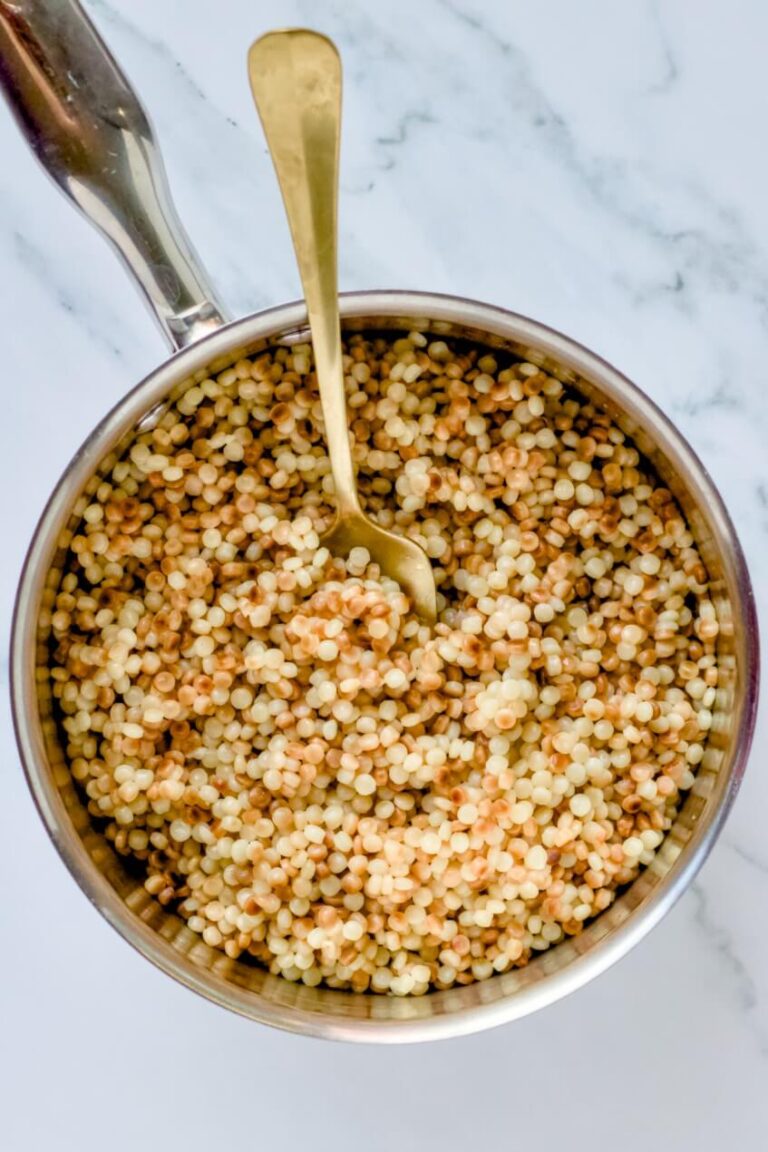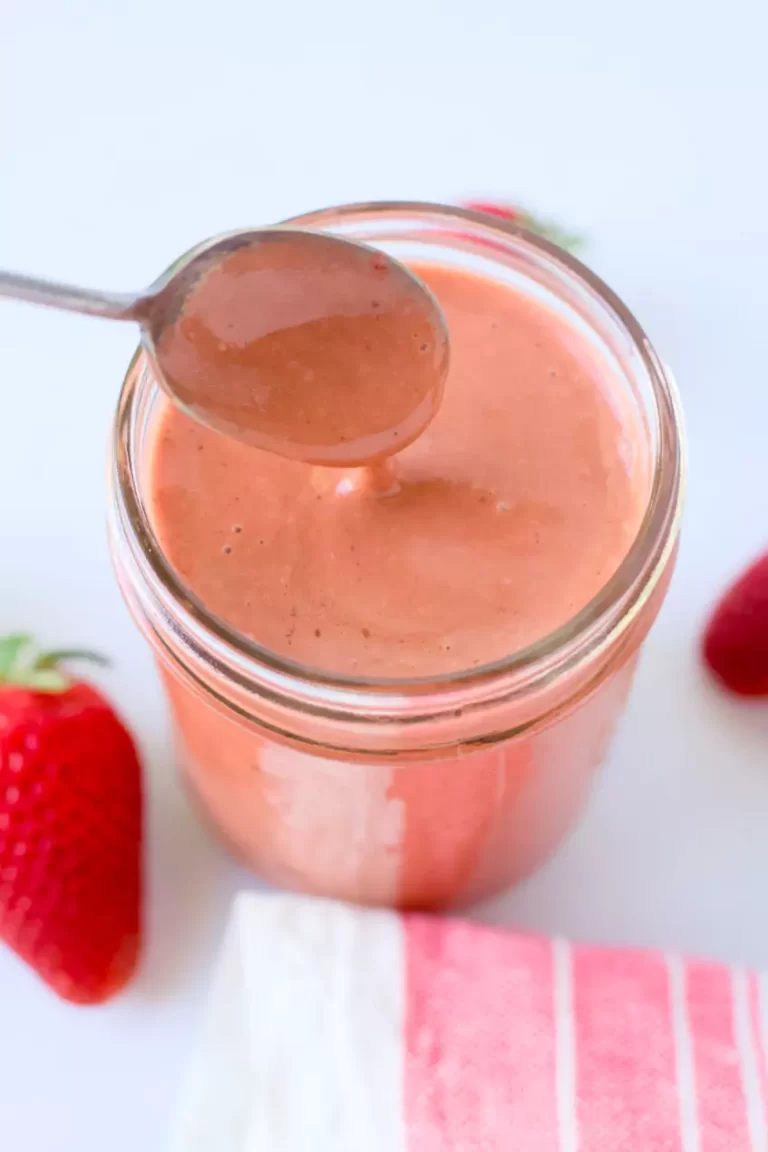How to Make Almond Milk
If you’ve ever looked at the ingredients in store-bought almond milk, you might have noticed some unexpected extras—preservatives, thickeners, and sometimes even added sugar. The good news? Making your own almond milk at home is incredibly easy and budget-friendly.
In this guide, I’ll show you exactly how to make homemade almond milk.
Whether you want a plain, unsweetened version or something flavored with vanilla or a touch of sweetness, I’ve got you covered. Let’s get started!

Why you’ll love this homemade almond milk
If you’ve never made nut milk at home before, you’re in for a treat! It’s incredibly easy, tastes fresher than store-bought, and lets you control exactly what goes into it.
Here’s why you’ll love this homemade almond milk recipe:
Simple ingredients, no additives: Unlike store-bought versions that often contain gums and preservatives, this recipe uses just almonds, water, and an optional natural sweetener.
Creamy and customizable: You can adjust the thickness, sweetness, and flavor to your liking.
Budget-friendly: Making almond milk at home is often cheaper than buying it.
Ingredients and equipment
Making homemade dairy-free milk is simple and requires just a few basic ingredients and kitchen tools. Here’s what you’ll need and why each is important.
- Almonds – Use raw, unsalted almonds for the best flavor and texture. Soaking them softens the nuts, making them easier to blend and resulting in a creamier milk.
- Water – Tap water is just fine for soaking the almonds. However, I use filtered water from my fridge for blending the almonds into milk.
- Optional add ins – To jazz up your almond milk, you can choose to add a sweetener such as honey, maple syrup, or dates. You could also add vanilla or almond extract. A pinch of salt can also bring out the flavor.
Equipment
- Large bowl – Needed for soaking the almonds overnight, which helps soften them and makes blending easier.
- High speed blender – Essential for breaking down the almonds completely so the milk is smooth and creamy.
- Fabric to strain with – Used to strain out the almond pulp, leaving you with smooth almond milk. A large thin tea towel, cheesecloth, or a legit nut milk bag all work.
- 4 cup liquid measuring cup — Perfect for straining the milk into so you can easily transfer it to a container.
- Fine mesh strainer – Useful for setting over the measuring cup while straining the almonds.
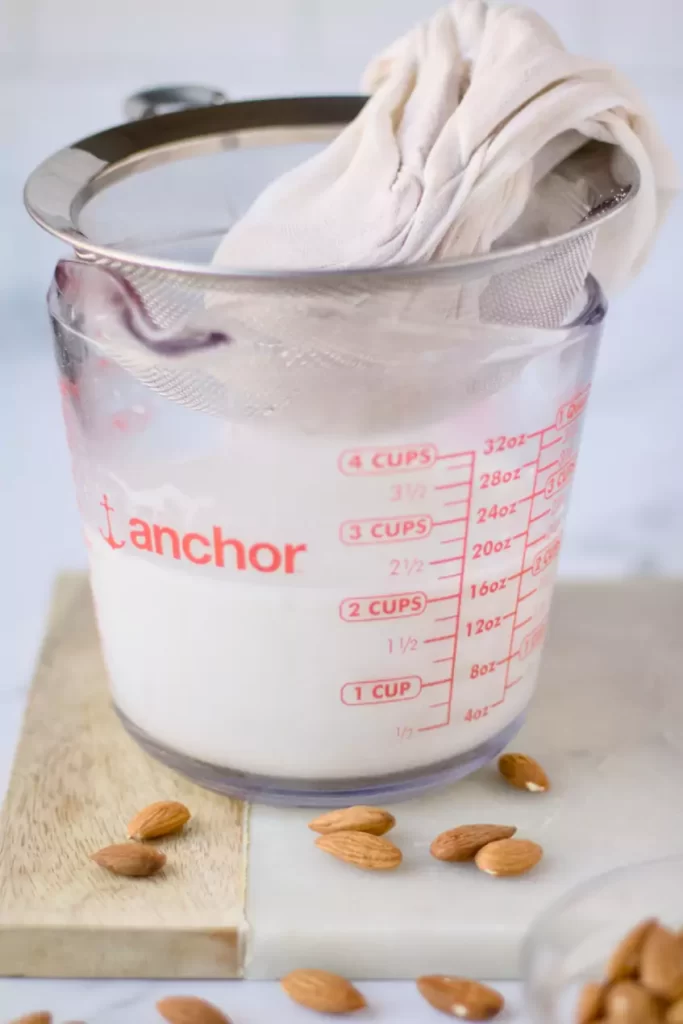
How to make almond milk
Making homemade almond milk is surprisingly easy to make. With just almonds, water, and a few optional add-ins, you can create a creamy, dairy-free milk perfect for drinking, baking, or pouring over cereal.
Here’s how to make it from scratch:
- Soak. Put the almonds in a bowl and cover them with water. Let them soak overnight (or at least 8 hours) to soften. If you’re short on time, you can do a quick soak by covering them with boiling water and letting them sit for 1 hour.
- Rinse. After soaking, drain the almonds and rinse them thoroughly under fresh water.
- Blend. Add the soaked almonds to a blender with 4 cups of filtered water. Blend on high for about 1-2 minutes until smooth and creamy. If want to sweeten using dates, add one or two soaked dates at this point.
- Strain. Set a fine mesh strainer on liquid measuring cup, place a thin tea towel or nut milk bag in the strainer, then pour the blended mixture through. Squeeze out as much liquid as possible. The remaining almond pulp can be saved for baking or smoothies.
- Jazz it up (optional). If you want to sweeten your almond milk, stir in 2-3 teaspoons maple syrup or honey. You could also add a splash of vanilla or almond extract.
- Store. Transfer the almond milk to a sealed container and refrigerate for up to 4 days. Shake well before using, as natural separation may occur.
Prep tips
Making homemade almond milk is simple, but a few key tips can help make the process as streamlined as possible:
- Soak the almonds overnight – Soaking the almonds for at least 8 hours (or overnight) softens them, making them easier to blend and resulting in a smoother, creamier milk. If you’re short on time, a quick soak in hot water for 1-2 hours can work in a pinch.
- Use filtered water – Filtered water helps prevent any unwanted flavors from affecting your almond milk.
- Blend thoroughly – For the creamiest texture, blend the almonds and water on high speed for at least 2 minutes. A powerful blender will break down the almonds the best.
- Strain well – Use a nut milk bag, cheesecloth, or thin tea towel to strain the almond pulp. Squeezing out every last drop ensures you get the most milk from your almonds.
- Strain into a 4 cup liquid measuring cup – When you squeeze the milk into a large measuring cup, it makes it so much easier to transfer it into a quart sized container. If you don’t have a 4 cup measuring cup, just strain the milk into a large bowl and transfer the milk using a ladle.
- If sweetening with dates – If you want to sweeten your almond milk with dates, make sure to soak them in hot water for about 5 minutes, drain them, then add the dates when you blend the almonds. Soaking the dates before helps them incorporate seamlessly.
How to store homemade almond milk
Here’s how to store your homemade almond milk so you can enjoy it for as long as possible.
1. Use an airtight container. Store almond milk in a clean, airtight glass jar or bottle. Glass helps preserve freshness and prevents the milk from absorbing odors from the fridge.
2. Keep it refrigerated. Homemade almond milk should always be stored in the fridge at or below 40°F. Since it has no preservatives, it can spoil if left at room temperature for too long.
3. Shake before using. Because homemade almond milk doesn’t contain stabilizers, separation is natural. Give it a good shake before using.
4. Use it within a week. Try to use your almond milk within 7 days of making it. If it starts to smell sour or tastes off, toss it.
5. Freeze for longer storage. If you won’t use it all in time, freeze your almond milk in ice cube trays for easy portioning. Once frozen, transfer the cubes to a freezer-safe bag and store for 3 months. Thaw in the fridge and shake well before using.

Conclusion
Making almond milk at home is easier than you might think, and the results are well worth it.
With just a handful of ingredients and a few simple steps, you can enjoy fresh, creamy almond milk free from additives and preservatives. Plus, you have full control over the sweetness and flavor.
Give it a try and experiment with different add-ins like vanilla, cinnamon, or even a touch of honey.

How to Make Almond Milk
January 31, 2025Equipment
- Bowl with lid or cover
- high speed blender
- Fabric to strain with (large thin tea towel, cheesecloth, or a legit nut milk bag)
- 4 cup liquid measuring cup (could also use a large bowl)
- Mesh strainer/colander
- Airtight quart sized container
Ingredients
- 1 cup almonds raw, unsalted
- tap water
- 4 cups filtered water you'll add 2 cups to the blender and 2 cups later
Optional Add-ins
- ½ – 1 TBS maple syrup or honey
- 1 – 2 softened pitted dates
- 1 tsp vanilla
- ¼ tsp almond extract
Instructions
- Put the almonds in a bowl and cover them with tap water that goes above the almonds by at least an inch. Cover the bowl and let the almonds soak overnight (or at least 8 hours) on the counter. If you're short on time, you can do a quick soak by covering them with boiling water and letting them sit for about 1 hour.1 cup almonds, tap water
- After soaking, pour the almonds into a mesh strainer/colander and rinse them thoroughly under running water.
- Add the soaked almonds to a blender along with 2 cups of the filtered water (we'll add the other 2 cups of filtered water later). If you want to sweeten your almond milk with dates, add 1 or 2 soft dates* to the blender as well. Blend on high for about 1-2 minutes until smooth and creamy.4 cups filtered water
- Set a mesh strainer/colander over a 4 cup liquid measuring cup or large bowl, place a thin tea towel, cheesecloth, or nut milk bag in the strainer, then pour the blended mixture through.(Straining the milk into a large measuring cup makes it easier to pour the milk into a quart sized container later. You could also use a large bowl and transfer the milk using a ladle.)
- Gather up the towel, cheesecloth, or nut milk bag around the almond pulp, and squeeze out as much liquid as possible. You'll want to really squeeze hard, rotating the almond pulp every squeeze or so to evenly get out all the milk. You should end up with about 2 cups of concentrated almond milk.
- Add the remaining 2 cups of filtered water to the almond milk.
- If you didn't blend in any dates earlier and you want to sweeten your almond milk, you can stir in ½ – 1 TBS of honey or maple syrup at this point. You could also add 1 tsp of vanilla or 1/4 tsp of almond extract. Stir well.
- Pour the almond milk into a quart sized airtight container. Close the lid and shake well.
- Refrigerate for up to a week. Shake well before using, as natural separation may occur.


